中考英语一般将来时完整归纳
【英语】 中考英语一般将来时20篇(附带答案解析)
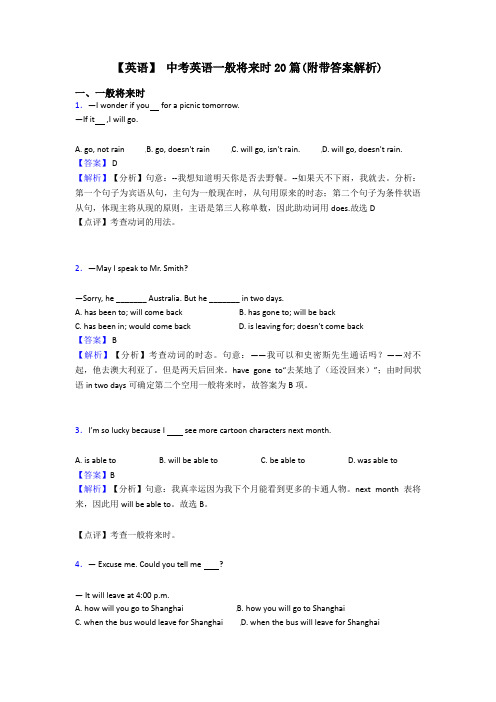
【英语】中考英语一般将来时20篇(附带答案解析)一、一般将来时1.—I wonder if you for a picnic tomorrow.—If it ,I will go.A. go, not rainB. go, doesn't rainC. will go, isn't rain.D. will go, doesn't rain.【答案】 D【解析】【分析】句意:--我想知道明天你是否去野餐。
--如果天不下雨,我就去。
分析:第一个句子为宾语从句,主句为一般现在时,从句用原来的时态;第二个句子为条件状语从句,体现主将从现的原则,主语是第三人称单数,因此助动词用does.故选D【点评】考查动词的用法。
2.—May I speak to Mr. Smith?—Sorry, he _______ Australia. But he _______ in two days.A. has been to; will come backB. has gone to; will be backC. has been in; would come backD. is leaving for; doesn't come back【答案】 B【解析】【分析】考查动词的时态。
句意:——我可以和史密斯先生通话吗?——对不起,他去澳大利亚了。
但是两天后回来。
have gone to“去某地了(还没回来)”;由时间状语in two days可确定第二个空用一般将来时,故答案为B项。
3.I’m so lucky because I see more cartoon characters next month.A. is able toB. will be able toC. be able toD. was able to【答案】B【解析】【分析】句意:我真幸运因为我下个月能看到更多的卡通人物。
中考英语一般将来时和过去将来时专项讲解
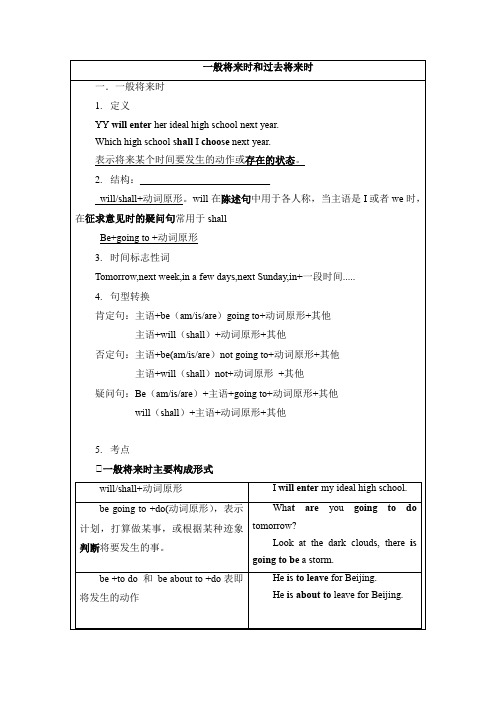
一般将来时和过去将来时一.一般将来时1.定义YY will enter her ideal high school next year.Which high school shall I choose next year.表示将来某个时间要发生的动作或存在的状态。
2.结构:__________________________will/shall+动词原形。
will在陈述句中用于各人称,当主语是I或者we时,在征求意见时的疑问句常用于shallBe+going to +动词原形3.时间标志性词Tomorrow,next week,in a few days,next Sunday,in+一段时间.....4.句型转换肯定句:主语+be(am/is/are)going to+动词原形+其他主语+will(shall)+动词原形+其他否定句:主语+be(am/is/are)not going to+动词原形+其他主语+will(shall)not+动词原形+其他疑问句:Be(am/is/are)+主语+going to+动词原形+其他will(shall)+主语+动词原形+其他5.考点①一般将来时主要构成形式will/shall+动词原形I will enter my ideal high school.be going to +do(动词原形),表示计划,打算做某事,或根据某种迹象判断将要发生的事。
Wha t are you going to do tomorrow?Look at the dark clouds, there is going to be a storm.be +to do 和be about to +do表即将发生的动作He is to leave for Beijing.He is about to leave for Beijing.He is leaving for Beijing.Be+doing表将来(come,go,leave,start等瞬间动词)翻一翻我将会待在这个漂亮的城市。
初中英语2024届中考语法复习一般现在时和一般将来时知识讲解
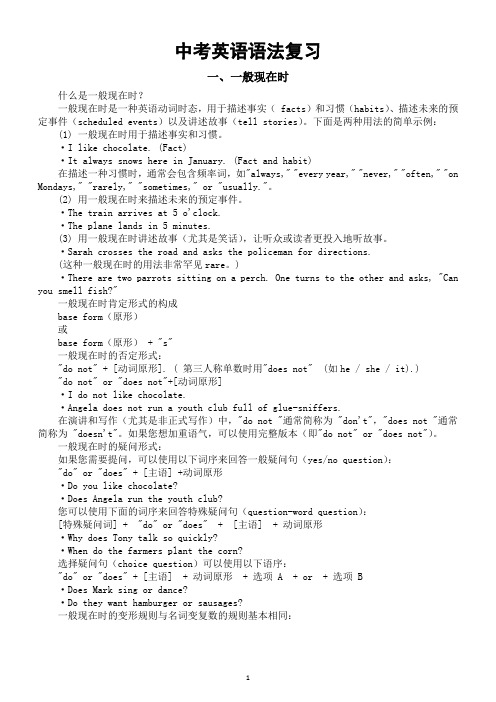
中考英语语法复习一、一般现在时什么是一般现在时?一般现在时是一种英语动词时态,用于描述事实( facts)和习惯(habits)、描述未来的预定事件(scheduled events)以及讲述故事(tell stories)。
下面是两种用法的简单示例:(1) 一般现在时用于描述事实和习惯。
·I like chocolate. (Fact)·It always snows here in January. (Fact and habit)在描述一种习惯时,通常会包含频率词,如"always," "every year," "never," "often," "on Mondays," "rarely," "sometimes," or "usually."。
(2) 用一般现在时来描述未来的预定事件。
·The train arrives at 5 o'clock.·The plane lands in 5 minutes.(3) 用一般现在时讲述故事(尤其是笑话),让听众或读者更投入地听故事。
·Sarah crosses the road and asks the policeman for directions.(这种一般现在时的用法非常罕见rare。
)·There are two parrots sitting on a perch. One turns to the other and asks, "Can you smell fish?"一般现在时肯定形式的构成base form(原形)或base form(原形) + "s"一般现在时的否定形式:"do not" + [动词原形]. ( 第三人称单数时用"does not" (如he / she / it).)"do not" or "does not"+[动词原形]·I do not like chocolate.·Angela does not run a youth club full of glue-sniffers.在演讲和写作(尤其是非正式写作)中,"do not "通常简称为 "don't","does not "通常简称为 "doesn't"。
初中英语一般将来时
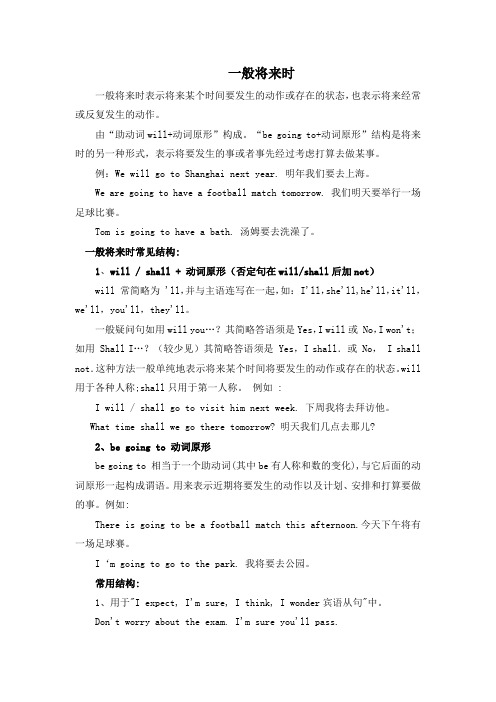
一般将来时一般将来时表示将来某个时间要发生的动作或存在的状态,也表示将来经常或反复发生的动作。
由“助动词will+动词原形”构成。
“be going to+动词原形”结构是将来时的另一种形式,表示将要发生的事或者事先经过考虑打算去做某事。
例:We will go to Shanghai next year. 明年我们要去上海。
We are going to have a football match tomorrow. 我们明天要举行一场足球比赛。
Tom is going to have a bath. 汤姆要去洗澡了。
一般将来时常见结构:1、will / shall + 动词原形(否定句在will/shall后加not)will 常简略为 'll,并与主语连写在一起,如: I'll,she'll,he'll,it'll,we'll,you'll,they'll。
一般疑问句如用will you…?其简略答语须是Yes,I will或 No,I won't;如用 Shall I…?(较少见)其简略答语须是 Yes,I shall.或 No, I shall not.这种方法一般单纯地表示将来某个时间将要发生的动作或存在的状态。
will 用于各种人称;shall只用于第一人称。
例如 :I will / shall go to visit him next week. 下周我将去拜访他。
What time shall we go there tomorrow? 明天我们几点去那儿?2、be going to 动词原形be going to 相当于一个助动词(其中be有人称和数的变化),与它后面的动词原形一起构成谓语。
用来表示近期将要发生的动作以及计划、安排和打算要做的事。
例如:There is going to be a football match this afternoon.今天下午将有一场足球赛。
2025年中考英语语法复习课件一般将来时

A. isn’t working
B. doesn’t working C. isn’t going to working D. won’t work
(D)3. He __ very busy this week, he __ free next week.
A. will be; is B. is; is C. will be; will be D. is; will be
没有英语考试。
一般将来时态的结构: 第2类:be going to + 动原 一般疑问句:Be动词 + 主语 + going to+动原+其它? • Is he going to collect any data for us? 他会帮我们收集数据吗
? • Are they going to have an English test next week?他们下周有
一般将来时态的结构: 第1类:will/shall + 动原 肯定句:主语 + will + 动原 + 其它.注意缩写:will = 'll如: They will go shopping next Friday.=They'll go shopping next Friday. 他们下周五要去购物。 • I will/shall do a better job next time. 下次我要做得好些。
开。 • He is coming here this afternoon. 今天下午他要来这儿。 • When are they going to Beijing? 他们准备什么时候去北京? • I am leaving for Liuzhou tomorrow. 我打算明天去往柳州。 • I'll write to you as soon as I arrive there. 我到了那里,就写信
一般将来时态知识点详解(初中英语专项复习) (4)
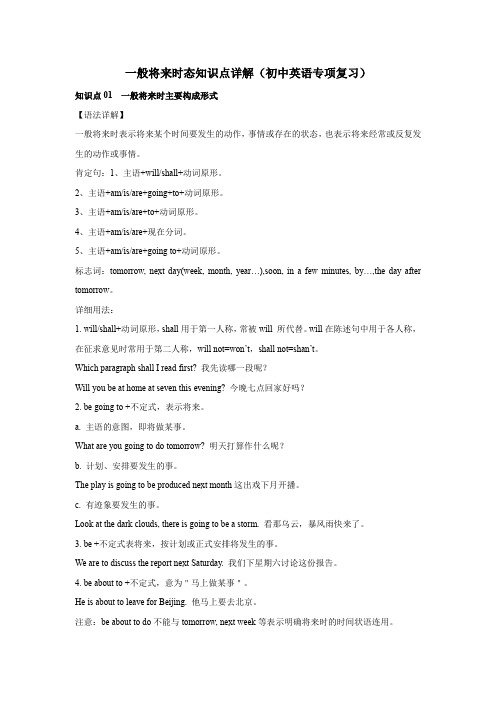
一般将来时态知识点详解(初中英语专项复习)知识点01 一般将来时主要构成形式【语法详解】一般将来时表示将来某个时间要发生的动作,事情或存在的状态,也表示将来经常或反复发生的动作或事情。
肯定句:1、主语+will/shall+动词原形。
2、主语+am/is/are+going+to+动词原形。
3、主语+am/is/are+to+动词原形。
4、主语+am/is/are+现在分词。
5、主语+am/is/are+going to+动词原形。
标志词:tomorrow, next day(week, month, year…),soon, in a few minutes, by…,the day after tomorrow。
详细用法:1. will/shall+动词原形,shall用于第一人称,常被will 所代替。
will在陈述句中用于各人称,在征求意见时常用于第二人称,will not=won’t,shall not=shan’t。
Which paragraph shall I read first? 我先读哪一段呢?Will you be at home at seven this evening? 今晚七点回家好吗?2. be going to +不定式,表示将来。
a. 主语的意图,即将做某事。
What are you going to do tomorrow? 明天打算作什么呢?b. 计划、安排要发生的事。
The play is going to be produced next month这出戏下月开播。
c. 有迹象要发生的事。
Look at the dark clouds, there is going to be a storm. 看那乌云,暴风雨快来了。
3. be +不定式表将来,按计划或正式安排将发生的事。
We are to discuss the report next Saturday. 我们下星期六讨论这份报告。
一般将来时的知识点归纳

一般将来时的知识点归纳关于一般将来时的知识点,在英语的语法中,一般将来时可以表达或者推测将来发生的动作或状态,主要包括:将来现在完成时(Future Perfect)以及将来简单时(Future Simple),对应着中文中的“将来完成时”、“一般将来时”等概念。
将来完成时由这几种变异组成:将来完成完成式(Future Perfect Continuous)、将来完成式(Future Perfect)、将来完成进行式(Future Perfect Continuous)。
它们的复合形式表达将来某个时间段内完成的动作,几种变异及其语法如下:(1)将来完成式(Future Perfect)语法结构为:will/shall have + 过去分词其用法有:主句用will/shall have,它可以表达将来某一特定时间前发生的动作或状态,而且仍将持续到将来某一时间。
例如:By next week, I will have tidied the room. 到下周时,我将把房间打扫干净。
(2)将来完成进行式(Future Perfect Continuous)语法结构为:will/shall have+ been + 动词-ing 形式其用法有:表示将来某一时间前持续进行的动作。
例如:By the end of this month, I will have been living here for five years. 到本月底,我将已在这里住了5年。
(3)将来简单式(Future Simple)语法结构为:will/shall + 动词原形其用法有:指示将来将发生的事情,即将要发生的动作或意向。
例如:I will call him tomorrow. 我明天会打电话给他。
总之,一般将来时是英语中非常常用的语法时态结构,它可以用来表示将来发生的动作或者将要发生的意向,在英语语法学习中占据了不可忽略的地位。
2024年中考英语语法复习—一般将来时课件

2)用在由when,if等引导的时间状语从句和 条件状语从句中,表示将来的动作。
If it doesn’t rain tomorrow,we will go hiking. 如果明天不下雨,我们将去远足。
★一般将来时经常会伴随一些时间状语,比较常见的有:
tomorrow
soon
next week下周
练习
1 . There ________ a sports meet next week if it
________.
A.is going to have; doesn’t rain
B.is going to be; doesn’t rain
C.is going to be; won’t rain D.is going to have; won’t rain
Will you go there? 你要去那儿吗?
“Shall I...?”“Shall we...?”常用来征求对方意见。“Will you...?”表示客气的邀请或请求。
Will you please open the window? 请你把窗打开,好吗?
3.否定句:在will/shall后加not,可缩写成 won’t/shan’t 陈述句:I will go there./I shall go there. 我要去那儿。
to +
+其他
not,即主语+be not going
I am not going to watch the video. 我不准备去看录像。
3)一般疑问句:将be
Is he going to see a doctor? 他准备去看医生吗?
4)含有be goi to+动词原形+其他
- 1、下载文档前请自行甄别文档内容的完整性,平台不提供额外的编辑、内容补充、找答案等附加服务。
- 2、"仅部分预览"的文档,不可在线预览部分如存在完整性等问题,可反馈申请退款(可完整预览的文档不适用该条件!)。
- 3、如文档侵犯您的权益,请联系客服反馈,我们会尽快为您处理(人工客服工作时间:9:00-18:30)。
中考英语一般将来时完整归纳一、初中英语一般将来时1.—I've never seen Mr. Taylor before.—Don't worry. I ______ him to you before the meeting.A. will introduceB. introducedC. have introducedD. had introduced【答案】 A【解析】【分析】句意:——我以前从没见过泰勒先生。
别担心。
开会前我会把他介绍给你。
根据上句 I've never seen Mr. Taylor before. 到现在为止没有见过他,所以才有开会前介绍给你。
要用一般将来时,will+动词原形。
故选A。
【点评】考查一般将来时的构成和用法。
注意根据语境确定动词的时态。
2.—Have you watched the new movie Kung Fu Panda 3, Kelly?—Not yet. I _____ it with my classmate tonight.A. will watchB. was watchingC. have watched【答案】A【解析】【分析】句意:—凯莉,你看过新电影《功夫熊猫3》吗?—还没有呢。
今天晚上我要和我的同学一起去看。
A. will watch一般将来时态形式;B. was watching过去进行时态形式;C. have watched现在完成时态形式。
本句描述的是今天晚上将要发生的动作,句子用一般将来时态。
故选A。
【点评】本题考查时态辨析。
以及will watch;was watching;have watched三种时态的用法和区别3.— Excuse me. Could you tell me ?— It will leave at 4:00 p.m.A. how will you go to ShanghaiB. how you will go to ShanghaiC. when the bus would leave for ShanghaiD. when the bus will leave for Shanghai【答案】 D【解析】【分析】这是一道根据回答写出问句所缺成分的题目,阅题时要仔细分析回答的句子。
句意:打扰一下,你能告诉我这辆公交车什么时候动身前往上海吗?它将会在下午4点的时候离开。
据回答知问句问的是时间,故排除A和B。
由题知,句子是一般将来时,故问句中也要用一般将来时态。
故选D。
【点评】本题需要考生根据回答反推问题,在阅题时要仔细审题。
4.In the near future, there ________ self-driving cars in our city.A. isB. wasC. areD. will be【答案】 D【解析】【分析】句意:在不久的将来,我们城市将会有自动驾驶汽车。
根据In the near future,可知时态是一般将来时,there be结构的一般将来时为:there will be,故选D。
【点评】考查时态,注意there be结构的一般将来时为:there will be的用法。
5.We ________ a party for Kate. It's supposed to be a surprise.A. were havingB. hadC. will haveD. have had【答案】C【解析】【分析】句意:我们将为凯特举办一个聚会。
这应该是个惊喜。
根据句意语境可知举办聚会这个动作还没有发生,需用一般将来时,故选C。
【点评】考查动词时态辨析题。
熟练掌握时态的用法。
6.Could you tell me____?A. when will they leave BeijingB. when would they leave BeijingC. when they will leave BeijingD. when they would leave Beijing【答案】 C【解析】【分析】句意:你能告诉我他们什么时候离开北京吗?这是含有宾语从句的主从复合句。
从句用陈述语序,疑问词+主语+谓语,故排除A B;主句中的could表示语气的委婉,不是过去时。
根据句意,从句用一般将来时。
故选C。
【点评】此题考查宾语从句。
注意从的语序和时态。
7.—You'd better take an umbrella. The weather report says it in the afternoon.— Thank you. I will put one in my bag.A. will rainB. rainsC. is raining【答案】 A【解析】【分析】句意:——你最好带把伞。
天气预报说是下午要下雨。
——谢谢你。
我会在包里放一个。
A一般将来时,B一般现在时,C现在进行时,根据 in the afternoon和 I will put one in my bag 可知时态是一般将来时,故选A。
【点评】考查时态,注意一般将来时的用法。
8.The Disneyland Park in Shanghai in a few years.A. will completeB. will be completedC. has completedD. is completed【答案】 B【解析】【分析】句意:几年之后,这个迪尼斯公园将在上海被建成。
根据时间状语in a few years可知本题用将来时的被动语态will be done的结构。
结合句意,故选B【点评】此题考查一般将来时的被动语态的用法。
9.— Let's go fishing if it this weekend.— But nobody knows if it .A. is fine; will rainB. will be rain; rainsC. will be fine; will rainD. is fine; rains【答案】 A【解析】【分析】句意:——如果这个周末晴天我们去钓鱼吧。
——但是没人知道是否会下雨。
第一个空前的if引导条件状语从句,意思是“如果”,从句中用一般现在时表示将来;第二个空前的if引导宾语从句,意思是“是否”,根据从句的tomorrow可知用一般将来时;故选A。
【点评】考查动词的时态。
10.I wonder when they ________ for Beijing. I will go to the train station to see them off whenthey ________.A. will leave; leaveB. leave; will leaveC. go; leaveD. will go; leave【答案】 A【解析】【分析】句意:我想知道他们什么时候去北京。
当他们离开的时候,我将去车站送他们。
leave for,动身前往,去……。
第一句话是宾语从句,因此从句可以使用一般将来时,第二句是when引导的时间状语从句,应遵循主将从现的原则,因此应使用一般现在时,故答案是A。
【点评】考查动词辨析和时间状语从句中的主将从现原则。
注意识记固定搭配leave for,同时只要记住在时间状语从句中的主将从现原则。
11.We're leaving tomorrow. We ______come back _________ next Friday.A. will, fromB. won't, inC. will. onD. won't, until【答案】D【解析】【分析】题意:我们要走了,直到下周五才回来。
根据题意,应用not… until. 且用一般将来时,故选D。
12.I don't know if my brother _____________ here tomorrow. If he _____________, I'll call you.A. comes; comesB. will come; comesC. comes; will comeD. will come; will come【答案】 B【解析】【分析】句意:我不知道是否我哥哥明天将来,如果他来,我将给你打电话。
第一个句子中if意思是是否,tomorrow表明时态是一般将来时,所以用will come;第二个句子中if 意思是如果,引导条件状语从句,从句用一般现在时,主句用will+动词原形,句子是从句,所以用一般现在时,主语是he,所以用comes,故选B。
【点评】考查一般将来时和条件状语从句,注意平时识记if的用法,理解句意。
13.—We _____ to Yun Brocade Museum with the exchange students this coming summer holiday.—That's amazing!A. wentB. goC. have goneD. will go【答案】D【解析】【分析】句意:——即将到来的暑假,我们将和交换生一起去云锦博物馆。
——太神奇了。
went是一般过去时;go是动词原形,一般现在时;have gone是现在完成时;will go是一般将来时。
根据this coming summer holiday可知是将来的时间,所以用一般将来时态,故答案选D。
【点评】考查动词的时态。
14.—Hello, Mary! Have you finished your homework?—Oh, not yet. It ______ in half an hour.A. will finishB. is finishedC. is going to finishD. will be finished【答案】 D【解析】【分析】句意:---嗨,玛丽,你完成作业了吗?---哦,还没有。
我半个小时后就完成。
in+时间段,表示“多长时间以后”,用一般将来时。
主语it指上文的homework,与finish之间构成被动关系be+过去分词,所以此处是一般将来时的被动语态,故答案为D。
【点评】考查动词的时态和语态,注意语境中的时间状语是判断时态的关键,确定主语和动词的关系可以确定动词的语态。
15.Look on the bright side of life, and imagine that you ______ a happy and successful future.A. hadB. will haveC. haveD. have had【答案】 B【解析】【分析】句意:看到生活中光明的一面,想象你将会有一个幸福成功的未来。
